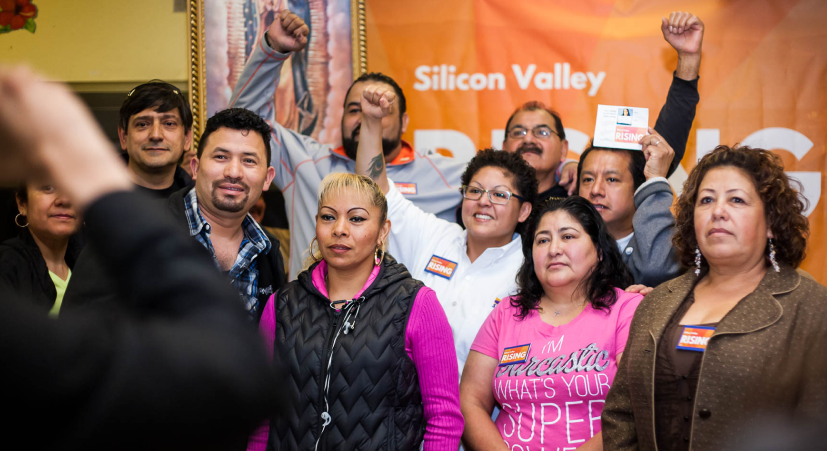
Labor

Every Worker Matters
Ensuring that a tech-driven economy works for everyone means that every job—whether in tech or not—should be a good job. That means expanding on-ramps to jobs in tech as well as strengthening worker protections across the labor force.
Our Labor Values
As a society, we have accepted the idea that certain jobs are less valuable than others—despite the evidence that shows us that our perceived value of a job is dramatically shaped by the race, gender, and ethnicity of the people performing the job. These ideas, handed down to us generation after generation, have disproportionately impacted Black, brown, and immigrant communities. We believe that all workers, irrespective of their title or job duties, must be paid a living wage, have access to good benefits, and be treated with respect.
As a result of anti-union policies, union membership has fallen to its lowest rate in a hundred years. At the same time, the top 1% of income earners have increased their wages by 150% over the past forty years, while the bottom 90% have increased their wages by only 22% during that same time period—even though worker productivity has skyrocketed by more than 250%.
Massive structural changes in corporate tax policy and labor law over the past four decades have created severe inequality in the labor market. Without an appropriate counterweight to unending corporate power, we see worker’s rights, safety, and economic stability plummet. We believe that workers, both direct employees and contractors, must have a voice and vehicles to build power—inside and outside of their workplaces—in order to rebalance power and bring stability back to the economy.
We know that it’s possible for all workers to make a living wage, have a roof over our heads, and put food on our tables. When we don’t live up to that vision it’s not because of scarcity—it’s because of choices. Policymakers, corporate leaders, and politicians have chosen to implement policies that expand our unequal economic system to benefit a small number of people while half of all Americans can’t find $400 in an emergency. We can make different choices and achieve better outcomes for everyone.
Labor Policy Goals
Protect all workers
Tech companies and other large corporations have the opportunity and the necessary resources to become model employers for all of their employees—headquarters, warehouse, and contractors—ensuring living wages, affordable benefits, and pathways to economic mobility.
Within the tech sector, we see large disparities emerging between headquarters, warehouse, and contracted workers. Companies must be held accountable to responsible contracting standards, labor protections, respecting the right of employees to organize, and removing artificial barriers between workers that suppress wages, benefits, and working conditions.
Expand and equip the workforce
Often we hear of workforce training initiatives, billed to help underserved communities find entry points to good jobs and tech employment. While we support this idea, we know that this is an insufficient strategy. Training as a stand-alone approach will not lead us out of inequality and will not guarantee employment for most displaced workers. In order to solve this crisis, we must undertake multiple strategies—massive jobs programs, high labor standards and protections for all jobs, and innovative recruitment, training, and development of new and diverse talent.
At the same time, the tech industry, which is notoriously exclusive, has an imperative to make its employee base more representative of the population at large—not just to create broader economic opportunity, but because companies with diverse representation at all levels are more likely to be successful than those that aren’t. Diverse representation also makes companies more likely to avoid product and business decisions that harm society.
Meet everyone’s basic needs
As inequality deepens and corporate power grows, many workers cannot make ends meet while working full-time and often multiple jobs. Our limited social framework provides meager benefits to those living in abject poverty, but ignores that the majority of Americans struggle to access healthcare, pay rent, and afford child care. This approach leaves millions of workers and their families on a precipice where one emergency can push them into poverty, homelessness, or worse.
We need a new social contract that ensures everyone has the basics to survive. We are intrigued by bold ideas being put forth in California and across the nation for guaranteed income, affordable public healthcare, secure publicly-held retirements, portable employment benefits, and more. We must strengthen our social safety net such that no one falls through the cracks.
Labor Advisors
Stay Up-To-Date
Sign up for our mailing list to get weekly updates on how you can get plugged in.




